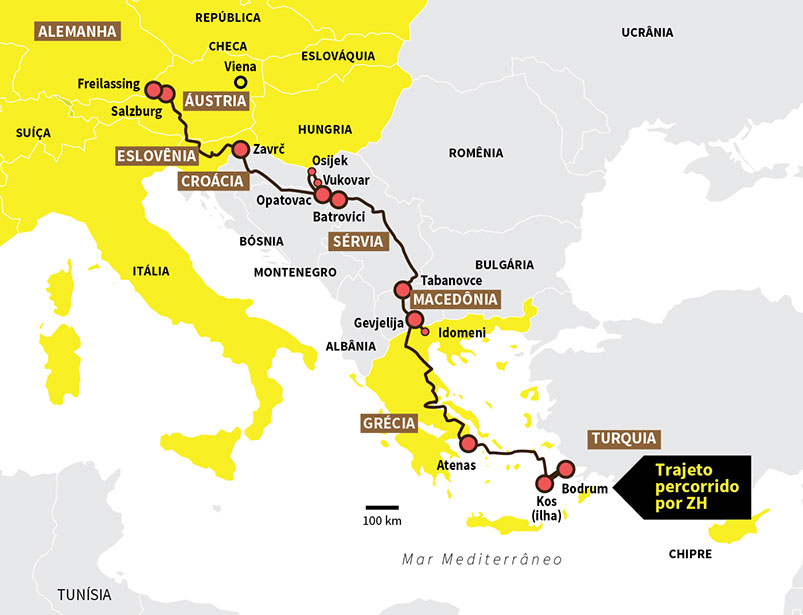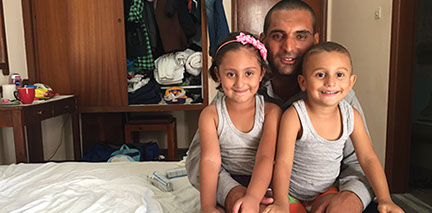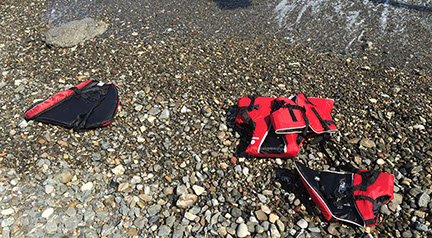A refugee story
Posted on October 10, 2015
Eight days, seven countries and over 2590 kilometers: Zero Hora follows the journey of a Syrian family searching for a new dawn on a trip from the Greek island of Kos to southern Germany.
TEXTS and photos
Letícia Duarte
leticia.duarte@zerohora.com.br


An epic short crossing
Ghazi
Razan
Tala
Mohammad
Zero Hora follows the modern odyssey of Ghazi, Razan, Tala and Mohammad: a father, a mother and their two children who left Raqqa, the first capital of a Syrian province to be taken over by ISIS, for a new life in Germany.
Mohammad sees the tears running on his father’s face and comes closer, as if trying to comfort him.
“Baba, baba!”
The 3-year-old still doesn’t know the reason his father is crying. Sitting at the foot of a single bed, in the room where his family has been lodged by volunteers in the Greek island of Kos, the father examines the picture of his tiny Syrian compatriot Aylan Kurdi on my cellphone screen. It’s the first time he’s seen the photo which started going around the world on September 2nd, eighteen days ago. He looks at his youngest child, who is the same age as the boy in the picture, a boy who became the symbol of the tragedy faced by refugees following his death in a fatal boating accident. He looks at his firstborn Tala, 5, who plays with the phone next to the bed.
It was because of them that Ghazi Alissa, 32, set out on this journey. The same journey that Aylan did not complete.
“Did he die ...in the sea?” he asks me, leaning forward to have a better look at the picture.
On the previous day, I had been on the beach where Aylan's body was found in Turkey. I mentioned the story to Ghazi, assuming he would be familiar with the news. After seeing the image, he started crying. The picture was not only a symbol to him. It was the embodiment of their greatest fears. Only 48 hours before, Ghazi, his wife and their two children were being bounced around in the same overcrowded inflatable boats, exposing themselves to the same risks in the Aegean Sea in order to to escape the Syrian war. They had boarded on the same Turkish beach, Bodrum, and were bound for Kos, one of the main gateways for refugees in Europe. It's the place Aylan was trying to reach, where many others have never managed to set foot. Of the 300,000 people who have crossed the Mediterranean heading for Europe last year, 2,500 are estimated to have died or gone missing along the way, according the UN High Commissioner for Refugees (UNHCR).
“I'm doing all this for my children. They are my life, my soul” Ghazi repeats in a choked voice, wiping his eyes.
Outside, the temperature is nearing 30°C (86°C) in this late summer afternoon. This Sunday, September 20th, there are at least 800 refugees camped in Kos, a tourist destination with crystal clear waters that saw its traditional flow of luxury boats and yachts surpassed by an influx of rubber boats — makeshift vessels that transport the people who have left almost everything behind except their hope. From a distance, the beach looks like a summer camp, with rows of colorful tents fronting the sea. As we get closer, the landscape is taken over by tired faces, children's and adult's life jackets lying on the sand, clothes hanging out to dry, mothers changing their children´s clothes on rugs, people rubbing soap and shaving under the sun and volunteers running around to fetch water, food and clothes for those who arrive. And every day, there areat least a few hundred more people arriving. Because they have children, Ghazi and his wife were given a temporary home where they can wait for the documents that will allow them to continue their journey. Their dream is to make it to Germany, where Chancellor Angela Merkel, nicknamed "Mama Merkel," has declared that refugees would be welcome.
A Physics graduate and the former teacher of a secondary school, Ghazi has planned his escape for about a year, after having completed his Master's degree in Meteorology at the University of Cairo in Egypt. When he came back to Syria after four years living abroad, he found a city with no jobs for him, no schools for his children, explosions everywhere, and severed heads as a punishment measure for any violation of the extremist code imposed by religious fundamentalists. A resident of Raqqa, the first province capital to be conquered by the rebels in 2013 and ISIS in 2014 (and also the target of bombings in a government attempt to restore control over the city), Ghazi sums up in very few words all that he has left behind:
“Syria is dead. There is no future for my children; there is no future for anyone.”
The family left their hometown on September 4th, the same day Aylan's body was buried in Kobani. To make the trip, he gathered his savings and received help from relatives. He paid traffickers $3,600 for a boat crossing with his family from Bodrum to Kos. The price is charged per person: $1200 for him and his wife and half the price for each of the children. They traveled on a boat measuring 20 square meters, with nine adults and two children, and it was only on the third attempt that they managed to cross the 20 kilometer distance between Bodrum and Kos. On the first attempt, the boat was seized by the Turkish coast guard. The second time, they missed the boat. The father is relieved that everyone survived the crossing, but the stress of the trip still weighs on him.
“It was a 30-minute trip, but to me, it felt like 30 years. Life stopped between Bodrum and Kos,” he sighs.
Ghazi remembers his children crying, frightened by the waves that towered above the boat. Tala was all curled up in a corner. Mohammad was on his lap, holding him tightly. He and his wife were at the bow in their soaking wet clothes, trying to protect their children from unpredictable dangers. Ghazi can't swim, but he says he did not fear for his life. His little ones were the only thing on his mind. Throughout the trip, passengers recited the Koran, praying for Allah's protection. They believed they had no other option. Staying in Syria would mean certain death. Venturing out in the sea was an attempt to survive.
“They are killing everyone in Syria: children, women, the elderly. If you're in Syria, you're dying.” Ghazi says.
Na orla da ilha grega de Kos, refugiados recebem roupas e acessórios e acomodam-se em barracas doadas
Trip brought 11 migrants together
Ghazi holds on to his faith, telling me that the waves became more intense on two occasions when they stopped praying on the boat. Then, they resumed their prayers and reached the other side. When they landed, they knelt, in awe, on the sand to give praise for the protection of their God.
While the father tells me this epic story in the English he learned during the time he was in Egypt for his Master's degree, Razan Assad, 30, the mother of his children and a graduate in Arabic Language and Literature, approaches me with a smile, serving tea and biscuits for her unexpected visitor. They are surprised to know there is a Brazilian journalist interested in their history. She offers me the butter cookies that volunteers gave her when she arrived. I accept with embarrassment, wondering if the family has enough food to eat. But then I began learning one of the first lessons of the trip: breaking bread is highly valued by Syrians. They won't let you turn down an offer. They always share their food, and usually expect their guests to eat first.
“Take it, take it!” they insist.
Sipping his tea, Ghazi talks about the anticipation of the trip. He has been following the news and is aware that Europe has raised obstacles in its borders, but no barrier seems insurmountable after conquering the sea that has already swallowed so many of his compatriots. Still, he has no idea how he is going to reach the final destination. He says he will find out along the way, and that he dreams of seeing his children in school and getting his PhD in Germany.
Ghazi com os filhos, Tala e Mohammad, na Ilha de Kos
During the conversation another Syrian migrant, Musa Amohammed, 23, comes out of the shower. He was on the same boat as the family, and like the other members of the group, mostly young, he is now considered part of this family that the crossing built. A Physical Education student in Syria, Musa spent two months in Turkey working as a carpenter, but says he had to give up because his bosses wouldn't pay him. The calluses that the heavy work caused are still visible in his hands. Since he’s staying on the beach, he takes the opportunity to shower in the family's hotel room. When he sees me taking pictures, he says that he can't be on Facebook. He's afraid of being found and chased by warring factions. Again and again, his hand passes in front of his neck, indicating what they do in Syria to those who go against the restrictions imposed by ISIS. It's a throat-slitting gesture.
“Daesh, Daesh” he speaks; the Arabic acronym for ISIS.
Musa was the one who led me to this place. I found him on the beach late in the morning, playing on the sand with Mohammad and Tala. The children have picked Musa, smiling and affectionate with them, to be their biggest friend. On the way to the hotel, which is at least 10 blocks away from the beach, he points at a refugee begging on the sidewalk.
“These people aren't Syrians. Now everyone wants to be Syrian” he says, surprised at the number of migrants from countries like Pakistan and Bangladesh, where there is no war, seeking asylum opportunities in Europe.
At the hotel, the subject is mentioned for a second time. Ghazi says he doesn't mind other people using Syria's name to seek better living conditions. As long as the rights of Syrians are respected.
“We like everyone” he says.
Now that the sea has been crossed, Ghazi's main concern is to know when they will be able to move on. They are waiting for the papers that will allow them to stay in Greece for 30 days - a passport of sorts for the beginning of their trip to Macedonia, the first border they will have to cross to reach Germany. Ghazi believes the documents should be ready by the next morning, and expects to continue the trip as soon as he gets the papers. There is no time to lose.
A few hours later, he finds out that the documents will be ready sooner than expected. The police have posted a notice on their bulletin board informing that new permits will be issued by late afternoon. At 6:00 p.m. that Sunday, September 20th, lines begin to form in front of the police headquarters, a building with large arches at the front which takes up half of a block on a seaside avenue.
A little less than two hours later, Ghazi, Razan and their children come out of the building holding their treasured documents. They are happy, but they seem hurried. They sit on a green carpet stretched on the beach with other members of the "boat family", and plan the next steps of the journey. They will stay together, all of them. While they talk, little Mohammad eats rice with peas, the meal that volunteers distribute in tin foil packages. He smiles between bites, revealing the dimples on his cheeks. The grown-ups try to buy boat tickets to Athens on the same day, but there are no places left in the next ship. It will take another night. They pay 54 euros per person and get tickets for a ship of the Blue Star Ferries company, set to leave at 19:45 the following day. The next part of the trip has a date and a time to begin.
edition ONLINE
Rafael Balsemão
edition
Luiz Antônio Araújo
Design
Diogo Perin


